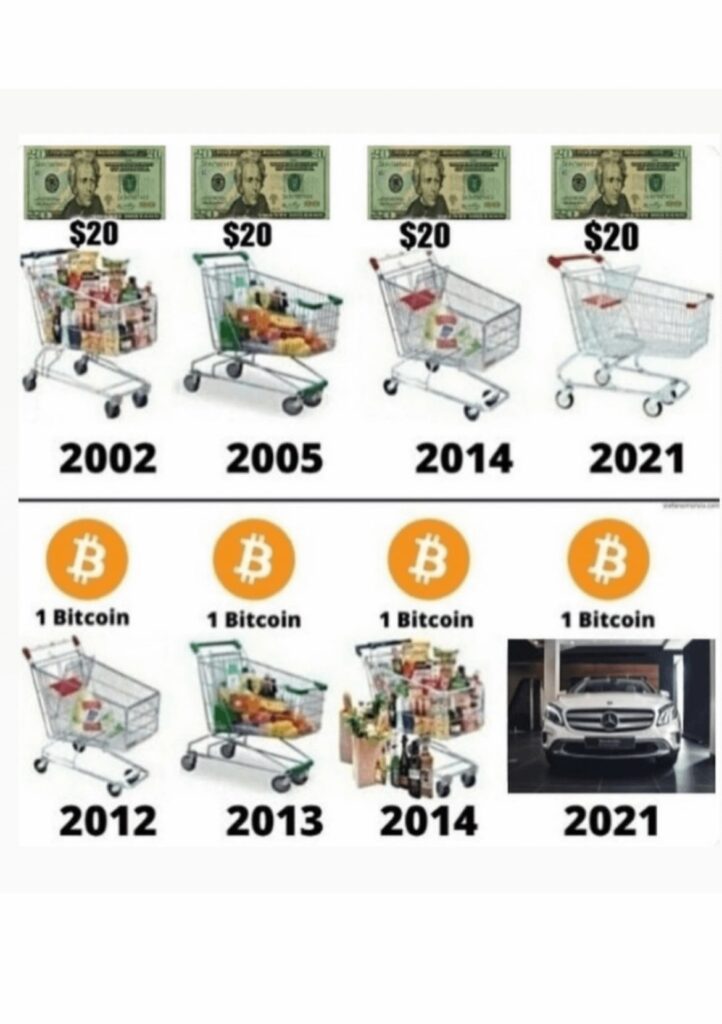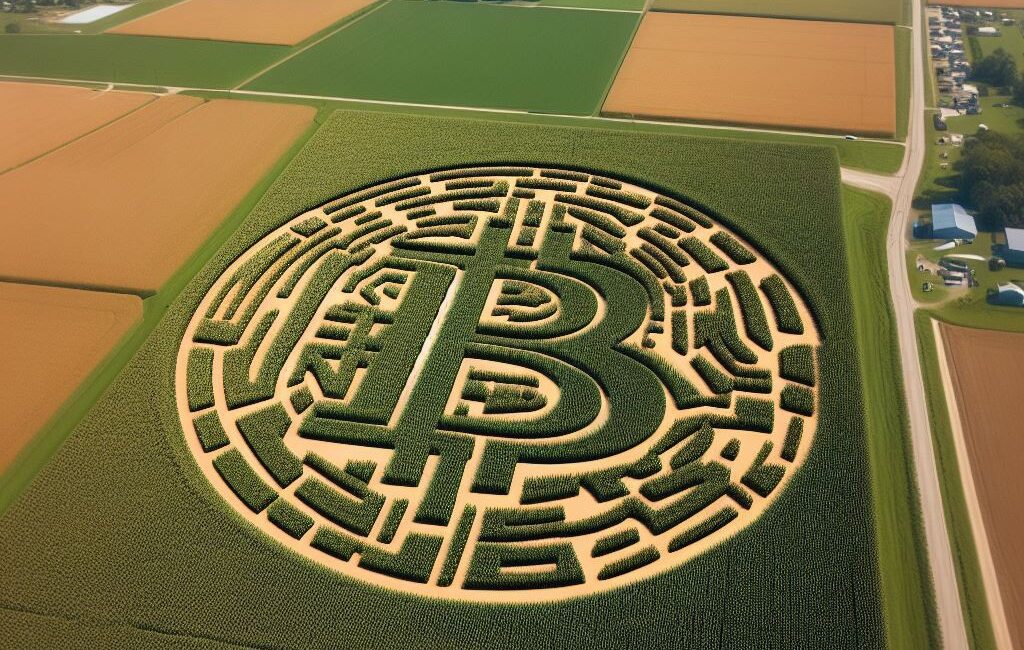As we plow forward to a future of AI and globalization, the concepts of self-sovereignty and freedom have never been more crucial to bring to the public discourse. This article explores, at a high level, the parallels between investing in Bitcoin and farming, both of which represent pathways to greater decentralization and individual empowerment in this new world. Through examining the challenges faced by farmers within the current economic and regulatory landscape, alongside the potential of Bitcoin as a tool for wealth preservation and autonomy, we can uncover insights into reclaiming our freedom and self-sovereignty.
Centralization and Inflation:
Centralization, whether in monetary systems or agricultural industries, poses significant risks to individual sovereignty. The current monetary system incentivizes centralized control, leading to inflationary pressures that erode the wealth of hardworking individuals, including farmers and small business owners. Rising costs, coupled with regulatory burdens and high taxes force farmers into a perpetual struggle to maintain profitability, often resulting in overextended debts and precarious financial situations. The relationship between our global governments and central banks like the Federal Reserve consistently adds debt and currency debasement stress on the population. Inflation is the hidden tax on citizens which robs us of our labor and purchasing power. Millennials are finding out very quickly the negative effects of inflation. Many college graduates are starting out with well-paid salaries but huge student loan bills and record-high rents and food costs. They can barely afford living expenses, let alone save to buy a house or invest anything in their future.
Currency debasement is not a new concept; it has been going on since the beginning of monetary trade and has been the downfall of many an empire. In the United States, inflation hit the accelerator in 1971 when the US dollar completely cut ties with gold. This gave governments and central banks the green light to debase the currency and print money at the expense of the taxpayers. Inflation most recently skyrocketed from 2020-2023 when the Fed printed over $13 trillion during the pandemic through Covid relief, quantitative easing and infrastructure. According to the experts, this inflation was supposed to be “transitory,” but obviously we are looking at a much more permanent scenario.
Inflation hits the poor, middle class, and working families the hardest as the prices for the most important things like food and housing increase. Inflation tends to affect the top 1% much less as the value of their assets can usually rise at a faster pace than inflation. Inflation naturally causes asset prices to rise as too many dollars chase too few of goods and can make some feel like their net worth is increasing, but are the assets really increasing in value or is the money just worth less? Some assets may increase in value, but then you get to pay a higher tax on properties, investments, and necessities, and in general, everything becomes more expensive and your money buys less and less. (I think many middle-class families were not very happy with their latest property tax assessments.)
Inflation is a cancer on the general public; it creates a sense of hopelessness for the future. Most middle-class taxpayers are living paycheck to paycheck and when food and gas prices increase, their ability to save anything for the future diminishes and hopelessness can take over as any unforeseen expense can be devastating to a family or business. This can contribute to the general decay of society when so many people see no way out of the hole and no hope for a better future.
Enter Bitcoin:
Born out of the ashes of the 2008 financial crisis, Bitcoin operates on a decentralized network, immune to the whims of governments or central authorities. In contrast to centralized monetary systems, Bitcoin emerges as an opportunity for financial autonomy and a tool to fight inflation. Its fixed supply of 21 million coins and decentralized consensus mechanism make it the most scarce asset on the planet. Bitcoin has a monetary system based on math and cryptography; it cannot be changed or manipulated by bureaucrats or self-serving parties from a central bank or a corporation.
It is often asked, “What problem does Bitcoin solve?” This is an important question, as it solves one of the biggest problems we face but only few recognize…It solves the problem of unsound money. We have lost sound money principles in our current financial systems. Money is supposed to be a store of value; it is supposed to be a transfer of the energy of your labor for you to spend in the future. If your money immediately loses value, there is no incentive to save; your purchasing power erodes very quickly sitting in a bank savings account or under a mattress. Bitcoin at its core is a new form of money. It is not just a new means of exchange or payment; it is a permissionless monetary network that requires no third party to approve or settle transactions and it becomes more scarce over time. Unlike farming, or other commodities as the price goes up you can not produce more of it, the supply of newly mined coins only gets smaller every 4 years.
There are thousands of charts conveying how poorly stocks and other commodities perform over the long term against Bitcoin, but this image is a great example of how Bitcoin’s purchasing power increases exponentially while the dollar decreases over time.


Bitcoin’s significance lies not only in its scarcity but also in its revolutionary properties. Unlike traditional commodities like gold or silver, Bitcoin transcends physical limitations, offering unparalleled fungibility and transportability. Its censorship-resistant nature ensures financial freedom, allowing individuals to transact without fear of government intervention or confiscation. You do not have to worry about saying the wrong thing or voting for the “wrong” candidate to keep your financial status and ability to purchase goods. It is a preserver of our most basic human rights granted under our constitution. Life, liberty, and the pursuit of happiness and our ability to speak freely without persecution. It is not just a tool to fight inflation; it is also a tool to fight tyranny. If held securely, Bitcoin can never be confiscated by another person or government, and it can be transported with you anywhere in the world with nothing more than 12 words in your head.
In addition to its many societal benefits, the mathematical monetary policy is one of its strongest attributes. Bitcoin’s deflationary supply schedule, halving the new supply of Bitcoin every four years, mitigates the risk of inflationary devaluation, making it a compelling long-term investment for preserving wealth.
Farming in the Face of Regulation:
The challenges faced by farmers extend beyond economic pressures to encompass regulatory burdens and government intervention. In Europe, farmers are currently in a engaged in a struggle against unattainable ESG (Environmental, Social, and Governance) standards, imposed by governments in collusion with corporate interests. Farmers in the Netherlands, France, and Germany, Spain and Romania are embroiled in mass protest, blocking highways, disrupting supply chains, withholding goods, and even spreading manure on government buildings. This is one of the biggest stories that few know about and is getting little to no coverage in the United States. There is an all-out revolt and rejection of the global ESG agenda and excessive regulation going on in the farm industry in the EU. American farmers will want to pay attention and take notes on what these regulations mean for their operations when they are attempted in the United States. Will these farmers succeed in having their voices heard or will they be met with hostility from their government like the Canadian trucker protests? The Canadian trucker protest is the perfect example of why we need alternatives to the centralized financial system. Many protesters were debanked by their government and financial institutions for protesting what they considered unreasonable health mandates set forth by their governments. GoFundMe pages that supported the truckers were shut down ,Paypal also began denying services to anyone that was speaking out on politics and health issues that did not fit the acceptable narrative. The ability of the people to organically support and resist what many feel were tyrannical demands by their governments was shut down with a coordinated effort between tech, finance, and government agencies.
The consolidation of power jeopardizes the livelihoods of small-scale farmers, threatening to homogenize agriculture into a monopoly controlled by a select few. This is not a good scenario for the survival of humanity. Having our food supply and money supply controlled by a handful of powerful corporate interest groups has the makings of a dystopian nightmare that would give Huxley and Orwell chills.
The Path to Freedom:
To reclaim our freedom and self-sovereignty, we must resist the encroachment of centralized control in both monetary and agricultural domains. The Federal Reserve and other central banks across the globe will use their extensive powers and political influence to try to slow the adoption of Bitcoin while they attempt to create their own Central Bank Digital Currency. This would usher in a surveillance state like nothing we have ever seen. All transactions would be monitored, approved, or rejected at their discretion. Spending and consumption limits could easily be imposed, and social and health credit scores would be normalized. Bitcoin offers the alternative to this potential dystopian nightmare scenario. It is the chance to fix traditional financial systems, empowering individuals to safeguard their wealth and transact freely all over the globe. Similarly, advocating decentralization of agriculture, wherein family farms thrive and competition flourishes, is essential for preserving food quality, affordability, and accessibility.
In an era marked by increasing centralization and government overreach, the principles of self-sovereignty and freedom are more vital than ever. By embracing decentralized solutions in finance and agriculture, we can chart a course towards greater autonomy and resilience. Ultimately, the pursuit of freedom is not merely a philosophical ideal but a tangible endeavor. We must stay vigilant in preserving our freedoms, and we need to preserve the ability to speak and commerce freely with our fellow man without a central authority to undermine those freedoms. The more centralized the power becomes in the world, the less power and influence the common man possesses against the will of the few. Bitcoin protects our right to free speech, Bitcoin offers transactional freedom which is just as important as freedom of speech itself.
This article only scratches the surface of bitcoin and farming, it does not cover the risks and nuances involved in decentralized finance or farming nor does it cover the basics of bitcoin and cryptocurrency investment or uses. This was an introduction to the basic philosophy surrounding bitcoin and the need for us to maintain a strong family farming industry.
Disclaimer: The views and opinions expressed in this article are solely those of the author, [BitFarmer], and do not necessarily reflect the views or opinions of Conterra Ag Capital. This article is for informational and entertainment purposes only and should not be construed as financial advice. Readers are encouraged to conduct their own research and consult with a qualified financial advisor before making any investment decisions.





